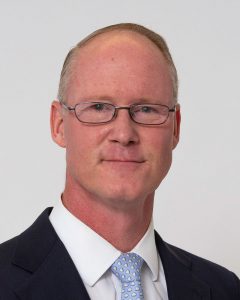Less than a year after adding a specially trained neuro-oncologist in the Division of Neurosurgery, UConn Health already has a precision tumor board specifically for brain and spine tumors.
Led by Dr. Kevin Becker, one of a relative few neuro-oncologists in the region, this group regularly convenes experts from disciplines including medical oncology, neurology, radiology, neurosurgery, orthopedics, and pathology to review patient cases and form consensus recommendations for individual treatment plans.

While the tumor board as a general concept is not new, the novelty of UConn Health’s brain and spine tumor board is an additional collaboration with its campus neighbor, The Jackson Laboratory for Genomic Medicine (JAX).
“Patients have access to a higher level of precision care through the rapid genomic sequencing of tumors that JAX can provide to us,” says Dr. Ketan Bulsara, chief of UConn Health’s Division of Neurosurgery. “We can use that data to see if there’s anything that might influence our choice of treatments. It’s a tumor board that incorporates precision medicine including high-level genomics so that treatment is specifically tailored to a patient’s tumor to optimize their outcome.”
Becker says what JAX provides is unrivaled. Within a week or so, the information that comes back includes the patient’s mutations, relevant clinical trials, applicable drugs approved by the FDA, and drugs that, while not approved for the exact disease, could be an off-label treatment option based on genetic analysis.

“It’s their incredible capability,” Becker says. “They are one of the premier genetic labs in the country, if not the world. Their expertise, and in particular their expertise with brain tumors, is second to none. In fact Roel Verhaak, one of the greatest thinkers and researchers for brain tumors in the country, has influenced the World Health Organization’s classification of gliomas. He’s a huge asset and he’s a big part of our collaboration as we shape the future of treatment for these patients. For us to have the tumor board and to also have this information pretty much in real time is really incredible and unique.”
It takes advantage of an age in which genetic information for brain and spine tumors is much more accessible than it historically has been, opening the door to mutational targets and drugs for specific tumors.
“Personalized medicine is something that for brain and spine we have lagged well behind the systemic tumors for a long time,” says Becker, who works in collaboration with the Department of Neurology and the Carole and Ray Neag Comprehensive Cancer Center. “There are a variety of reasons as to why that is, but this is something that is really where the future is going with neuro-oncology, and medical oncology is already on its way there as well.”
Beyond tumors that arise from the brain and spine, the new tumor board also will take up cases of metastatic disease, which is when cancer spreads from other areas of the body, for instance from the lung to the brain or the breast to the brain.

The establishment of a brain and spine tumor board has been a long-term goal of Dr. Susan Tannenbaum, the Neag Comprehensive Cancer Center’s clinical director.
“Having this large multidisciplinary group of specialists in surgery, radiation, oncology, neurology, pathology, radiology, and supportive services, to just mention a few, allows total care of patients with disease impacting their brain and spinal cord no matter what the site of origin,” Tannenbaum says.
The vision is for the group to be a valuable resource for both UConn Health patients and referring physicians in the community.
“What Dr. Becker has shown throughout his career is, he has this amazing facilitative power which focuses on the patient,” Bulsara says. “If somebody brings their patients to Dr. Becker’s tumor board, they get the benefit of having world-class multidisciplinary discussions regarding their patients and an additional team of experts who are available to them. Everything is aimed at optimizing teamwork, which will ultimately translate into improved patient outcomes.”
Tomorrow’s patients stand to benefit as well.
“Not only is it an important part of patient care, it’s actually also very much an educational session for the residents, the fellows, and even some of the attendees,” Becker says. “There’s a big educational component of that because neuro-oncology didn’t exist here before, and really most people who don’t work within the field have no idea of how it actually is managed.”
Longer-term, the vision is to incorporate clinical trials, the ramp-up for which has been on hold because of the pandemic.
Learn more about the UConn Health Division of Neurosurgery and the Carole and Ray Neag Comprehensive Cancer Center.



